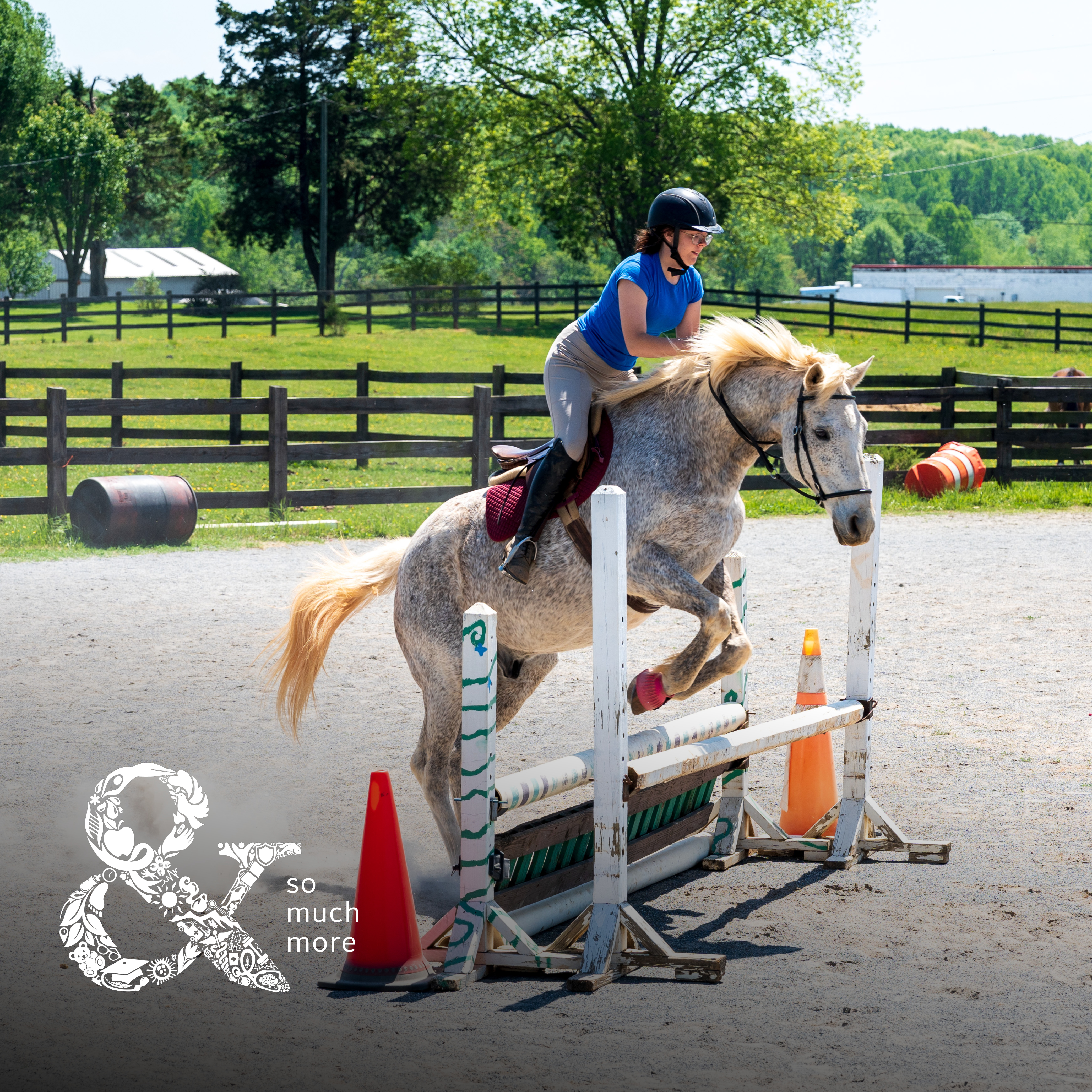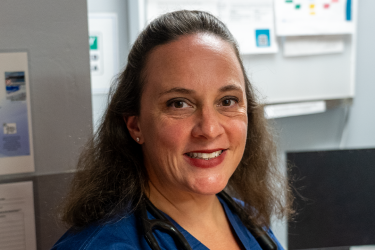Have you heard of Bedford County’s best kept secret?
On this episode of “& so much more,” we spent time on-site with one of our community partners, Brook Hill Farm. As a therapeutic riding and horse rehabilitation facility, Brook Hill touches the lives of both young individuals and horses, leaving a lasting impact on their well-being. Join us as we sit down with Brook Hill’s Assistant Director, Tracy Russler, to learn more about how this farm has been making a daily impact on the health of both youth and horses in central Virginia since 2001. Additionally, we'll hear from Jordan Altman, a former student whose personal testimony will touch your heart as she shares how riding at Brook Hill Farm transformed her life. Get ready to be inspired as we explore the genuine stories of growth and transformation that emanate from this special place!
Learn more about Brookhill Farm
Watch on YouTube
Transcript
Cami Smith:
Hi, and welcome to And So Much More. My name is Cami Smith and I'm here on this absolutely gorgeous, very windy day, so please excuse the wind, but I'm here with Tracy Russler. We are at Brook Hill Farm out in Bedford, Virginia. And this is, well, I don't want to tell your story. So, Tracy, why don't you tell us what is Brook Hill Farm?
Tracy Russler Assistant Director:
So Brook Hill Farm is a horse rescue and a therapeutic riding center for individuals in the Central Virginia area. We've been here since 2001. Our executive director, Jo Anne Miller, and her vet founded the place back then. It started off just with horses being dropped off that needed a place to go and some kids came in from the community and that bond that the horses and the kids gained here with the work program and they were failing schools, so we kind of chose an education major. So, she said, "Well, that can't happen." So we started tutoring them, saw how they could get through school, learned a lot of great life skills, and the dream became a reality. So we've been doing that ever since.
Cami Smith:
Wow. So tell me a little about the inner working. What type of organization is this at the heart? Is it a nonprofit or-
Tracy Russler Assistant Director:
We are a 501(c)(3) nonprofit for the community. And since that development of the United Neigh program, our horse program, we've branched out into programs for senior citizens, for individuals with diverse needs, whether mentally and physically. Horses are just a really powerful animal to really help kids and adults of all ages, all levels.
Cami Smith:
Well, this is one of the most peaceful places that I think I've ever been. Just in the atmosphere, you're surrounded by these beautiful hills. If you're listening, you can't see this, but for those of you who are watching, it's just gorgeous. So we've been talking over the past few months about and with the community partners at Centra has been able to come alongside of because of the amazing work that you do. So I love hearing the stories. Can you tell us any stories that you've been able to be a part of or even witness of how you've seen lives impacted through Brook Hill?
Tracy Russler Assistant Director:
I've seen kids come through the school program who don't have families, don't have support systems, and they're able to actually turn their lives around and set dreams and goals for themselves, graduate high school, actually start thinking about moving on and doing other educational opportunities.
We've had 139 kids come through our program and actually graduate high school and many of them have gone on to further their education and other opportunities. Two-year schools, [inaudible 00:03:09]. I've seen kids come through with mental health issues who just have given up and they come and work with the horses and go through the program and they can become contributing members of society.
Cami Smith:
Something comes alive inside.
Tracy Russler Assistant Director:
Yeah, it really does. It just allows them to grow and develop and move past. We all have obstacles that we have to deal with. Some just are a little heavier and the horses help them carry the obstacle to the next level and become successful.
Cami Smith:
And you're rescuing the horses as well. So I think one of the really beautiful things about this is that these are rescued horses who are coming alongside, really, rescued kids. You're pairing them together and you're seeing that bond and that partnership.
Tracy Russler Assistant Director:
And I think it is that pairing that Jo Anne does with the kids. We had a young child come in with diabetes that developed diabetes later in her childhood and it was at a formative age and because she couldn't become a part with her peers anymore, she just shut down with the whole eating thing. She dropped to a really unsafe weight and we had a horse come in that was a rescue that was severely malnourished.
And we got her to help in his rehab by helping plan a diet for him and how can we get him better? What do we need to do? So it took the focus off her, but yet she wanted to participate in the program, so she had to get enough calories to be able to do those things, right? And in the end, they became a little partnership riding and doing activities together. So stories like that can happen and the pairing between the horse and the child or the adult is really important.
Cami Smith:
Wow. Now, do they do school here on site?
Tracy Russler Assistant Director:
Yeah. Our schooling with horses program, we have a classroom. They do school onsite. We have a teacher and a counselor in the classroom with the kids keeping them on track. And of the kids, today, one of the teachers was saying, "Now, she doesn't like to get bad grades, she wants to do well in school." Whereas before she's like, "I don't really care if I fail." So just like that, once they can get the buy-in that education is important and that they can do more with it, that's the change.
Cami Smith:
So how has this impacted you?
Tracy Russler Assistant Director:
Well, gosh, I get to work in this beautiful environment every day.
Cami Smith:
It's incredible.
Tracy Russler Assistant Director:
Right. And I get to work with the horses and the kids. It keeps me young, keeps me active. I like being outside. The staff is great. We're all very team-oriented and collaborative, so we all work together really closely. It's long hours. Some days the heartache is big, but the reward at the end is great.
Cami Smith:
Yeah. Is there opportunity for the local community to partner with you or be a part of this in some way?
Tracy Russler Assistant Director:
Yeah, we actually have a very large volunteer program. I think last year I had 700 volunteers. It's 42 horses, as Jordan says, and a donkey.
Jordan Altman Barn Manager:
And a donkey. Romeo the donkey.
Tracy Russler Assistant Director:
Romeo, the donkey. It's a lot of work and some of the clients that we have are more physically challenged. I have one rider that's in a wheelchair, so I have an adaptive saddle for her. So I need two side walkers and a horse leader. But her dad's goal is for her to have fun and enjoy the years of her life that she has. And this is one thing that she really enjoys. So yeah, I'm always looking for volunteers.
Cami Smith:
Is there any level of training that has to be in place to become a volunteer?
Tracy Russler Assistant Director:
We take care of all that. So if you don't know anything about horses, don't feel you can't come out and volunteer because we'll take care of that for you.
Cami Smith:
Oh, wonderful.
Tracy Russler Assistant Director:
We're all about education, whether it's educating you to be a great volunteer, educating the youth to say, "I want to go on and make something of my life," or whatever. We're all about that.
Cami Smith:
I love that in some small way Centra gets to be a part of this. And when I think about just how many lives have been changed here and gone on from here to impact so many other people, you guys are just making such a huge impact, so thank you for all you're doing.
Tracy Russler Assistant Director:
Well, thank you for coming out, we appreciate it.
Cami Smith:
Absolutely.
Tracy Russler Assistant Director:
We appreciate Centra's support.
Cami Smith:
Absolutely. And we're going to get to hear a story from one of those students, Jordan. I am really excited that we get to not just be here at Brook Hill Farm, but we also get to hear a story from one of their students. So we're here with Jordan, who is a student at Brook Hill Farms. So, Jordan, why don't you just tell us a little bit about yourself?
Jordan Altman Barn Manager:
Okay. Well, I'm Jordan. I am 24 years old. I've actually been out here at Brook Hill Farm for about 11 years, I think now. I started out in their United Neigh program in my last year of middle school. I'm currently in college right now working on a degree in equine science because it's something I really like to do.
Cami Smith:
I love it. Did you know you wanted to do that before you came here?
Jordan Altman Barn Manager:
No, I did not. I had no clue what I wanted to do at all.
Cami Smith:
So tell us a little bit about that journey. What brought you here to Brook Hill back in middle school?
Jordan Altman Barn Manager:
I have a lot of abandonment issues from not growing up with a mom and dad around and living in a household with my grandparents who took me in and raised me, which wasn't also healthy as well. So I had a lot of anxiety, depression, social disorders with people. I'm not really getting myself out there. So that's what first brought me out here.
And then going into high school, I came with a lot more troubles of going down a path that a kid shouldn't really be going down at the age that I was and failing out of high school and that type of thing. But being out here was able to give me a reason to stay on track and give me a reason to want to do better and not be stuck anymore.
Cami Smith:
What did that transition look and feel like? So when you first came here, what were you doing?
Jordan Altman Barn Manager:
Being sad.
Cami Smith:
Did they immediately pair you with a horse or what was your program like?
Jordan Altman Barn Manager:
It's more of getting to know the horses and the people in the beginning and trial and error with some of the horses to see where we fit the best. For me, I already loved horses, so coming out here was a little bit easier for me than maybe some of the others.
Cami Smith:
Yeah. So over the last 10 years, you've probably seen a lot of students-
Jordan Altman Barn Manager:
I have, yes.
Cami Smith:
... come through that. Have you been able to be a part of any of their journeys since you appear to be an integral part here?
Jordan Altman Barn Manager:
Yes. I've become great friends with a lot of the girls here. We've had really close bonds because we're all here to support each other no matter what we're going through and no matter what stage in life we are at.
Cami Smith:
So what are your aspirations for the future?
Jordan Altman Barn Manager:
To be great, I guess. I don't know.
Cami Smith:
I love that.
Jordan Altman Barn Manager:
To be successful and continue to help others the way I was helped.
Cami Smith:
What advice would you give yourself as the middle schooler walking into Brook Hill Farm for the first time? Or maybe that advice would apply to some of these girls coming in.
Jordan Altman Barn Manager:
No matter what background we come from or whatever situation, we're all the same no matter what. We all have our own little things and it's okay to be different.
Cami Smith:
Yeah. I love that. What would you say was integral to you really finding your footing here?
Jordan Altman Barn Manager:
I'd say the relationship I had with the horses.
Cami Smith:
Who's your horse?
Jordan Altman Barn Manager:
Saucy.
Cami Smith:
Saucy.
Jordan Altman Barn Manager:
I have one named Amelia now though because I've graduated onto a little bit of a different level.
Cami Smith:
Okay. Is Saucy still here?
Jordan Altman Barn Manager:
She is very much here, happy and healthy.
Cami Smith:
Oh, I love that. So Saucy and Amelia.
Jordan Altman Barn Manager:
Yes.
Cami Smith:
So what does a day look like for you now here at Brook Hill?
Jordan Altman Barn Manager:
I just chip in wherever really needed, riding mine and here and there with some of the others and hanging out with the girls and that type of thing.
Cami Smith:
Okay. Awesome. Well, thank you so much for talking-
Jordan Altman Barn Manager:
No problem.
Cami Smith:
... with us, sharing your story. I know we grabbed you out from riding your horse behind us, but I really appreciate it.
Jordan Altman Barn Manager:
Of course.
Cami Smith:
And thank you everyone for listening in and for wanting to learn more about these incredible organizations that we've had a chance to talk about for these last few months. You can learn more about Brook Hill Farm at www.brookhillfarm.org. And then we'll also have a story coming up in our newsletter where we're going to be sharing a little bit about some of those who do get to serve here, volunteer here, as well as the heart behind Brook Hill. So thank you so much for joining in on And So Much More.




